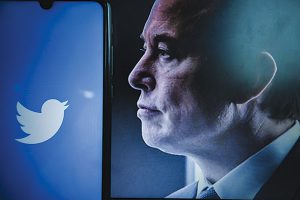“Free speech is the bedrock of a functioning democracy, and Twitter is the digital town square where matters vital to the future of humanity are debated,†Elon Musk tweeted after clinching his $44 billion takeover of the social-networking platform. What about nondemocracies, though?
If there is one government that has reason to welcome Musk taking control of Twitter Inc, it is probably in Beijing. It now has a friendly face in charge of a global channel for information — and misinformation — that is central to Chinese authorities’ efforts to seed and amplify narratives favorable to the Communist Party state.
Musk projects a maverick image at home in the US, thumbing his nose at the Securities and Exchange Commission, insulting critics and mocking President Joe Biden. When it comes to China, the world’s richest man adopts a more deferential persona. “I love China,†Musk said on meeting Premier Li Keqiang in Beijing
in 2019. “The economic prosperity that China has achieved is truly amazing, especially in infrastructure!†he tweeted when the party celebrated its centenary last July 1. “China rocks,†he told a podcast in 2020.
The Tesla Inc founder has reason to love China. The electric-vehicle maker has been given preferential access and perks including tax breaks and cheap loans, as well as the right to operate without a joint-venture partner, after striking a deal for a car-assembly plant with the Shanghai government in 2018.
Government support has helped to turn China into Tesla’s most important market outside the U.S., accounting for more than a quarter of revenue last year, when sales more than doubled to $13.8 billion.
That’s potential leverage. China has wielded commercial and trade ties for political ends in the past,
from restrictions on Australian wine and Norwegian salmon to boycotts of South Korean department stores. In 2019, a tweet by Daryl Morey, general manager of the Houston Rockets, in support of Hong Kong protesters was enough to get the team’s games pulled from broadcasts in China.
The National Basketball Association apologised, infuriating some US congressmen, and Morey later left his post.
“China will not hesitate to use any leverage it has,†said Duncan Clark, chairman of Beijing-based investment consulting firm BDA China Ltd, who studies the country’s internet market. “What we know about this place is that any way to gain some tactical advantage is normally taken.â€
Arguably, China already gets what it needs from Twitter. The platform has been blocked in the country since 2009, along with Facebook, Google and other US internet services. While barring local citizens from accessing it (though many use a VPN to circumvent the ban), Chinese officials and media companies use the social media site to project the government’s message abroad.
—Bloomberg
 The Gulf Time Newspaper One of the finest business newspapers in the UAE brought to you by our professional writers and editors.
The Gulf Time Newspaper One of the finest business newspapers in the UAE brought to you by our professional writers and editors.
